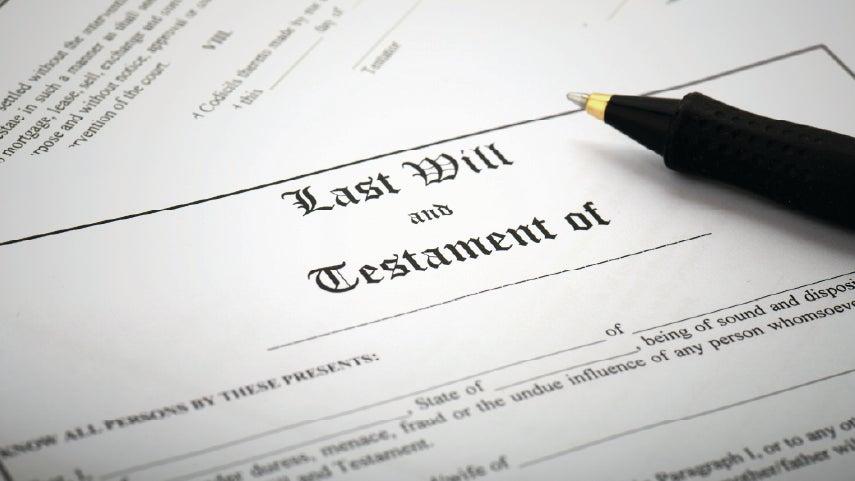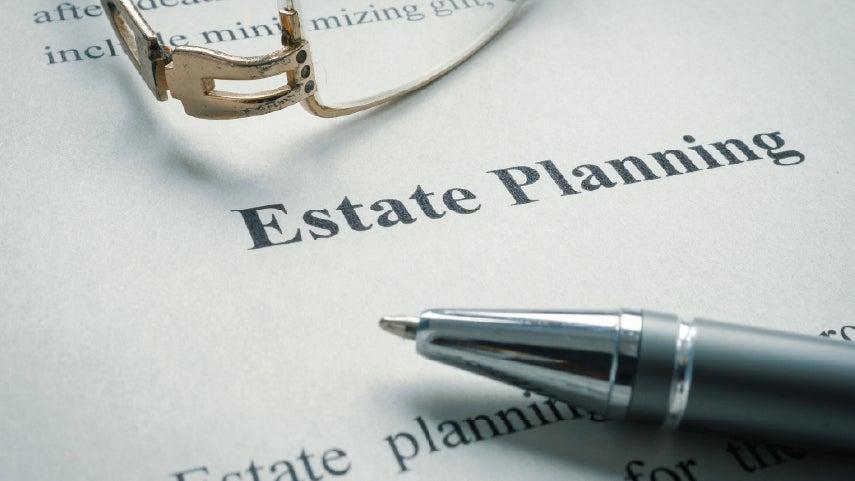The Ultimate Estate Planning Checklist: A Step-by-Step Guide
8 min read

Related Topics
Have you done your estate planning yet? Or do you keep kicking that can down the road?
The idea of planning your estate can be daunting. But it’s an important step in ensuring your wishes are carried out after you die or become unable to speak for yourself. Whether you have a modest estate or sizeable assets, a well-crafted plan allows you to protect your legacy and the people you care about.
This guide, complete with an estate planning checklist, walks you through the basic steps in creating a comprehensive estate plan.
Why is estate planning so important for older adults?
Contrary to popular belief, estate planning isn’t just for wealthy people. It should be considered by anyone who wants to make sure their wishes are respected and their assets are distributed in the exact manner they want after they pass. Estate planning can also address any financial obligations a person leaves behind after they die (so their family doesn’t have to).
Other benefits of a sound estate plan include:
- Minimizing estate taxes
- Avoiding the delays and costs of probate—the legal process of distributing a person's assets and settling their debts after they pass away
- Making health care decisions in advance
- Lessening the stress on family during a difficult time
With a calculated plan in place, you’ll feel confident knowing you’ve taken steps to care for both your future and your family’s.
Free estate planning checklist: Where to start
If your situation is simple, it’s reasonable to do your own estate planning—as long as you have clear instructions. That’s why we’ve created a free estate planning checklist covering the basics.
Here’s how to get started:
1. Make a will
Your will is the foundation of your estate plan. It outlines your wishes for distributing your property and assets and allows you to name:
- An executor who will oversee your estate
- Beneficiaries who will inherit your assets and belongings
- Guardians for any minor children or dependents
In most states, it’s fairly easy to create a will without a lawyer using state forms or online will maker sites. We've also thoroughly tested the best online will makers that allow you to create a will from the comfort of home.
2. Establish a living trust (optional but recommended)
A living trust is a legal document that lets you place your assets (e.g., your home, bank accounts, or investments) into a trust. You can still use and control those assets while you're alive. After you pass away, the assets in the trust go directly to your chosen beneficiaries.
While a will is essential, a living trust can provide additional benefits:
- It allows your heirs to avoid probate, which saves them time, money, and hassle.
- It can include provisions for managing your properties if you become incapacitated.
- It offers privacy, since trusts are not public records.
A living trust can be especially helpful for people with complex family dynamics, multiple properties (especially in other states), or beneficiaries who have special needs.
3. Create powers of attorney
A power of attorney (POA) is a legal document that gives someone else (your “agent”) the authority to manage your affairs in certain circumstances—such as when you’re traveling or you pass away or become incapacitated.
There are several types of power of attorney, including:
- General power of attorney: Your agent handles matters like banking, bill paying, property management, and legal and insurance matters.
- Medical (or health care) power of attorney: Your agent makes health care decisions for you if you can no longer communicate your wishes due to illness or injury.
- Durable power of attorney: This is a general POA that continues even if you lose the ability to make decisions for yourself.
Each POA type serves a unique purpose and offers varying levels of control to the agent. You can have multiple POAs with the same person as agent or different people, depending on what you prefer.
4. Prepare an advance health care directive
Also known as a living will, an advance health care directive is a document that states your health care preferences in end-of-life or emergency situations. This document names someone (your “health care proxy”) to make medical decisions for you based on your wishes and what matters most to you.
A living will may include your preferences relating to resuscitation, defibrillators, feeding tubes, and/or life support. It can offer clarity and comfort to your family if you’re no longer able to process information or communicate your wishes.
5. Gather and organize key documents
To make things easier for your executor and family members, it’s a good idea to gather and store important documents in one safe location. These documents may include:
- Birth and marriage certificates
- Property deeds and mortgage documents
- Insurance policies
- Bank and investment account statements
- Military service records (if applicable)
6. Review and update your beneficiaries
Make sure your beneficiary designations are current on all financial accounts:
- Life insurance
- Retirement accounts (401(k), IRA, pensions)
- Bank accounts or brokerage accounts with payable-on-death options
These designations can override your will, so it’s important to check them regularly and keep them up to date.
7. Inventory your assets and debts
Create a clear picture of your financial situation:
- Tangible assets: Real estate, cars, boats, motorcycles, personal belongings, collectibles
- Intangible assets: Checking and savings accounts, CDs, stocks and bonds, retirement accounts, life insurance policies, health savings accounts (HSAs), business ownership
- Debts: Mortgages, credit cards, loans, and other liabilities
Having a detailed list will help your executor settle your estate more efficiently.
8. Plan for your funeral or memorial service
Your estate plan should include instructions for final arrangements that reflect your personal values and preferences. Be sure to outline specifics pertaining to burial or cremation and any desired music, readings, or religious elements. Consider prepaying or prearranging funeral or memorial services—this can help relieve the burden on your family after you’ve passed.
9. Store all documents safely and securely
Once your estate planning documents are gathered and completed, keep all originals in a home safe or safe-deposit box. Tell your executor and trusted family members where to find it.
You can also use a digital storage solution for added security. Just make sure your executor and relatives have the correct login information (i.e., username/password) to access your account(s).
10. Discuss your plan with your family
Sharing your estate plan with family members now can prevent confusion, hurt feelings, and conflict down the road. Start by explaining your decisions related to your plan and your reasoning behind them. Let them know where to find important documents (e.g., your will) and share contact information for your attorney or financial advisor.
Estate planning document checklist: Must-have forms
An airtight and effective estate plan starts with having the right paperwork in place. Beyond life insurance policies, property deeds, and proof-of-identity documents, make sure you have these estate planning forms organized and accessible:
- Last will and testament: Explains how your assets should be distributed and names an executor to carry out your wishes; it can also appoint guardians for minor children
- Living trust: Holds your property during your lifetime and allows it to be distributed after your death without going through probate court
- Power of attorney: Gives someone you trust the legal authority to manage your financial or health care decisions if you become unable to do so
- Advance health care directive: Outlines your medical treatment preferences in the event of serious illness or end-of-life care
- List of assets and liabilities: Helps your executor locate your accounts, property, and debts to manage your estate effectively
- Titles, mortgages, and property deeds: For your home, owned vehicles, and other property
- HIPAA (Health Insurance Portability and Accountability Act) authorization: Allows select people (of your choosing) to access your private medical information if/when needed
- Beneficiary designations: Ensures certain assets, like life insurance or retirement accounts, are passed directly to your chosen beneficiaries
- Funeral instructions: Communicates your personal wishes for your funeral, memorial service, or other end-of-life arrangements
Revisit your estate plan anytime big life changes happen—like getting married or divorced, retiring, losing a family member, or switching or losing jobs. Even if your situation remains steady, it’s still smart to review your plan periodically since the laws related to estate planning can change.
Thoughtful estate planning now means less stress later
Think of your estate plan like a supportive and comforting safety net for your family. When your wishes are clearly spelled out in legal documents, they won’t have to guess what you would have wanted. That means less uncertainty and fewer disagreements, and quicker access to the resources they may need after you’re gone.
When is the best time to start estate planning? Today.
“Each and every one of us needs to have a plan in place, especially if you have children, especially if you own any property," Salvation Army Development Director, Matt Schmidt, told WGEM. "It just makes the transfer of anything you have so much smoother."
Frequently asked questions
What is the most important document in an estate plan?
The most critical document is usually the will. It explains what you want to happen to your money, property, and personal belongings after you die. It can also name someone to take care of your dependents or pets. A will helps make sure your wishes are followed and makes things easier for your family.
Do I need a lawyer to create an estate plan?
Not necessarily. For a simple estate, you can use reputable online platforms to create basic documents like a will or power of attorney. These platforms include Trust & Will, LegalZoom, and Rocket Lawyer.
If your estate is complex or you want legal guidance, it’s probably a good idea to talk to a qualified estate planning attorney.
What happens if I die without a will?
If you die without a will (known as dying intestate), the state decides how to distribute your assets—and it’s usually based on your next of kin. This can be a costly, time-consuming process and it may not reflect your true wishes. Dying without a will can also create added anxiety for your family during a time of grief. That’s why you’ll want to make a will the foundation of your estate plan.
Photo by John Altdorfer for Age-Friendly Greater Pittsburgh


